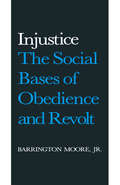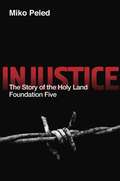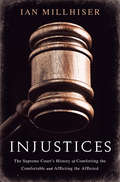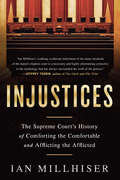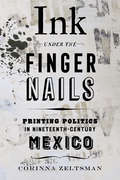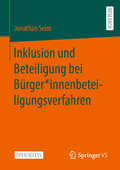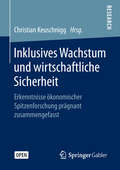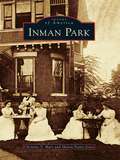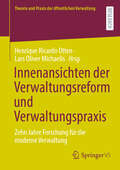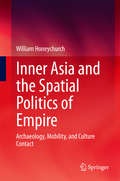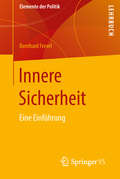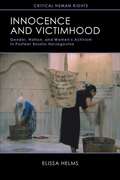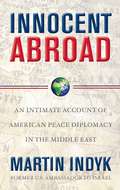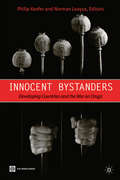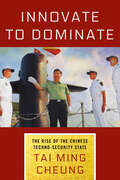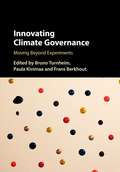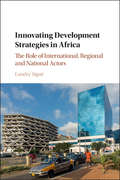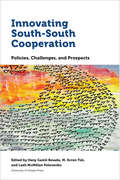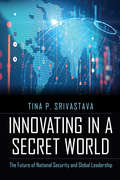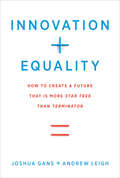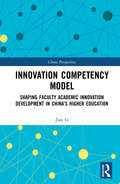- Table View
- List View
Injustice: The Social Bases of Obedience and Revolt
by Barrington Moore, JrFirst Published in 1978. Routledge is an imprint of Taylor & Francis, an Informa company.
Injustice: The Story of the Holy Land Foundation Five
by Miko Peled<p>In July 2004, federal agents raided the homes of five Palestinian-American families, arresting the five dads. The first trial of the "Holy Land Foundation Five" ended in a hung jury. The second, marked by highly questionable procedures, resulted in very lengthy sentences--for "supporting terrorism" by donating to charities that the U.S. government itself and other respected international agencies had long worked with. <p>In 2013, human rights activist and author Miko Peled started investigating this case. He discussed the miscarriages of justice with the men's lawyers and heard from the men's families about the devastating effects the case had on their lives. He also traveled to the remote federal prison complexes where the men were held to conduct deep interviews. Injustice traces the labyrinthine course of this case, presenting a terrifying picture of governmental over-reach in post-9/11 America.</p>
Injustices
by Ian MillhiserFew American institutions have inflicted greater suffering on ordinary people than the Supreme Court of the United States. Since its inception, the justices of the Supreme Court have shaped a nation where children toiled in coal mines, where Americans could be forced into camps because of their race, and where a woman could be sterilized against her will by state law. The Court was the midwife of Jim Crow, the right hand of union busters, and the dead hand of the Confederacy. Nor is the modern Court a vast improvement, with its incursions on voting rights and its willingness to place elections for sale. In this powerful indictment of a venerated institution, Ian Millhiser tells the history of the Supreme Court through the eyes of the everyday people who have suffered the most from it. America ratified three constitutional amendments to provide equal rights to freed slaves, but the justices spent thirty years largely dismantling these amendments. Then they spent the next forty years rewriting them into a shield for the wealthy and the powerful. In the Warren era and the few years following it, progressive justices restored the Constitution’s promises of equality, free speech, and fair justice for the accused. But, Millhiser contends, that was an historic accident. Indeed, if it weren’t for several unpredictable events, Brown v. Board of Education could have gone the other way. In Injustices, Millhiser argues that the Supreme Court has seized power for itself that rightfully belongs to the people’s elected representatives, and has bent the arc of American history away from justice.
Injustices
by Ian MillhiserFew American institutions have inflicted greater suffering on ordinary people than the Supreme Court of the United States. Since its inception, the justices of the Supreme Court have shaped a nation where children toiled in coal mines, where Americans could be forced into camps because of their race, and where a woman could be sterilized against her will by state law. The Court was the midwife of Jim Crow, the right hand of union busters, and the dead hand of the Confederacy. Nor is the modern Court a vast improvement, with its incursions on voting rights and its willingness to place elections for sale. In this powerful indictment of a venerated institution, Ian Millhiser tells the history of the Supreme Court through the eyes of the everyday people who have suffered the most from it. America ratified three constitutional amendments to provide equal rights to freed slaves, but the justices spent thirty years largely dismantling these amendments. Then they spent the next forty years rewriting them into a shield for the wealthy and the powerful. In the Warren era and the few years following it, progressive justices restored the Constitution’s promises of equality, free speech, and fair justice for the accused. But, Millhiser contends, that was an historic accident. Indeed, if it weren’t for several unpredictable events, Brown v. Board of Education could have gone the other way. In Injustices, Millhiser argues that the Supreme Court has seized power for itself that rightfully belongs to the people’s elected representatives, and has bent the arc of American history away from justice.
Injustices: The Supreme Court's History of Comforting the Comfortable and Afflicting the Afflicted
by Ian MillhiserNow with a new epilogue.Few American institutions have inflicted greater suffering on ordinary people than the Supreme Court of the United States. Since its inception, the justices of the Supreme Court have shaped a nation where children toiled in coal mines, where Americans could be forced into camps because of their race, and where a woman could be sterilized against her will by state law. The Court was the midwife of Jim Crow, the right hand of union busters, and the dead hand of the Confederacy. Nor is the modern Court a vast improvement, with its incursions on voting rights and its willingness to place elections for sale.In this powerful indictment of a venerated institution, Ian Millhiser tells the history of the Supreme Court through the eyes of the everyday people who have suffered the most from it. America ratified three constitutional amendments to provide equal rights to freed slaves, but the justices spent thirty years largely dismantling these amendments. Then they spent the next forty years rewriting them into a shield for the wealthy and the powerful. In the Warren era and the few years following it, progressive justices restored the Constitution's promises of equality, free speech, and fair justice for the accused. But, Millhiser contends, that was an historic accident. Indeed, if it weren't for several unpredictable events, Brown v. Board of Education could have gone the other way.In Injustices, Millhiser argues that the Supreme Court has seized power for itself that rightfully belongs to the people's elected representatives, and has bent the arc of American history away from justice.
Ink under the Fingernails: Printing Politics in Nineteenth-Century Mexico
by Corinna ZeltsmanDuring the independence era in Mexico, individuals and factions of all stripes embraced the printing press as a key weapon in the broad struggle for political power. Taking readers into the printing shops, government offices, courtrooms, and streets of Mexico City, historian Corinna Zeltsman reconstructs the practical negotiations and discursive contests that surrounded print over a century of political transformation, from the late colonial era to the Mexican Revolution. Centering the diverse communities that worked behind the scenes at urban presses and examining their social practices and aspirations, Zeltsman explores how printer interactions with state and religious authorities shaped broader debates about press freedom and authorship. Beautifully crafted and ambitious in scope, Ink under the Fingernails sheds new light on Mexico's histories of state formation and political culture, identifying printing shops as unexplored spaces of democratic practice, where the boundaries between manual and intellectual labor blurred.
Inklusion und Beteiligung bei Bürger*innenbeteiligungsverfahren
by Jonathan SeimIn diesem Open-Access-Buch widmet sich Jonathan Seim der Frage, wer an Bürger*innenbeteiligungsverfahren beteiligt werden sollte. Ob jene Konsultationsverfahren tatsächlich zu einer Stärkung der Demokratie beitragen können, hängt auch von der Beantwortung dieser bisher nur unzureichend thematisierten Frage ab. Die Arbeit ist interdisziplinär angelegt, insofern sie sich an der Schnittstelle zwischen politischer Philosophie und empirischer Partizipationsforschung bewegt. Im Verlauf der Auseinandersetzung bietet das Buch umfassende Bestandsaufnahmen der Inklusionspraktiken und Zielsetzungen kommunaler Bürger*innenbeteiligungsverfahren, eine legitimationstheoretische Einordnung der Verfahren in das Institutionengefüge repräsentativer Demokratie und einen entlang der Debatte zum Demos-Problem entwickelten Vorschlag zur Beantwortung der Forschungsfrage an.
Inklusive Schule im Sozialraum: Entwicklungsprozesse durch Kooperation und Interprofessionalität in herausfordernder Lage
by Robert Kruschel Saskia Schuppener Nico LeonhardtDer Band widmet sich der Frage, wie eine inklusive und sozialraumorientierte Schule gerade dort gelingen kann, wo nicht die optimalen Bedingungen herrschen – in herausfordernder Lage. Besonders Schulen in schwierigen sozialen Kontexten stehen vor der Herausforderung trotz der sie umgebenden Faktoren günstige Lernbedingungen für ihre Schüler*innen zu schaffen. Im Kontext des Zusammenspiels der drei zentralen Eckpfeiler des Bandes – Inklusion, Sozialraum und herausfordernde Lage – wird das Gelingen von Bildungsprozessen aus theoretischer, empirischer und handlungsleitender Perspektive diskutiert.
Inklusives Wachstum und wirtschaftliche Sicherheit: Erkenntnisse Ökonomischer Spitzenforschung Prägnant Zusammengefasst
by Christian KeuschniggDiese Open Access Buch geht den Fragen nach, wie inklusives Wachstum und wirtschaftliche Sicherheit entstehen, welche Rahmenbedingungen der Staat setzen und welche Reformen er auf den Weg bringen muss und wie sich wirtschaftspolitische Maßnahmen auswirken. Die besten Studierenden der Universität St. Gallen fassen prägnant und verständlich wichtige Ergebnisse der ökonomischen Spitzenforschung in führenden Fachzeitschriften zusammen. Die wissenschaftlichen Nachwuchstalente bereiten die empirischen Grundlagen der Wirtschaftspolitik für die Entscheidungsträger und die Öffentlichkeit auf und tragen zum Wissenstransfer in die wirtschaftspolitische Praxis bei.
Inman Park (Images of America)
by Christine V. Marr Sharon Foster JonesThe story of Inman Park, Atlanta's first planned suburb, is one closely tied with transportation ingenuity, trade, and the progressive determination of its citizens. Situated two miles east of downtown Atlanta, Inman Park was farmland when the Civil War ravaged its rolling hills. In the 1890s, Inman Park bloomed into Atlanta's first residential park, the location of choice for Atlanta's social elite. The growth of Atlanta, however, struck a blow to the development of this utopian suburb. By the mid-20th century, the suburb fell into dilapidation, abandoned by the prominent families of Atlanta. It was not until the 1970s that the neighborhood, like Atlanta itself, was raised from its ashes to become the celebrated example of Victorian restoration that it is today and was added to the National Register of Historic Places.
Innate Terrain: Canadian Landscape Architecture
by Alissa NorthInnate Terrain addresses the varied perceptions of Canada’s natural terrain, framing the discussion in the context of landscapes designed by Canadian landscape architects. This edited collection draws on contemporary works to theorize a distinct approach practiced by Canadian landscape architects from across the country. The essays – authored by Canadian scholars and practitioners, some of whom are Indigenous or have worked closely with Indigenous communities – are united by the argument that Canadian landscape architecture is intrinsically linked to the innate qualities of the surrounding terrain. Beautifully illustrated, Innate Terrain aims to capture distinct regional qualities that are rooted in the broader context of the Canadian landscape.
Innenansichten der Verwaltungsreform und Verwaltungspraxis: Zehn Jahre Forschung für die moderne Verwaltung (Theorie und Praxis der öffentlichen Verwaltung)
by Henrique Ricardo Otten Lars Oliver MichaelisDie öffentliche Verwaltung befindet sich in einem beschleunigten Veränderungsprozess. Welche Herausforderungen hierbei zu bewältigen sind, beleuchten die Beiträge dieses Bandes. Die Forscher*innen des Instituts für Personal und Management nutzen dabei die Vorteile ihrer transdisziplinären Expertise und der engen Zusammenarbeit mit einer großen Zahl von Behörden. Der Band zeigt das breite Spektrum an Forschungen, die im Rahmen dieses Instituts seit Jahren wissenschaftliche Einblicke in die Veränderungen der Verwaltungspraxis liefern und zur Verwaltungsmodernisierung beitragen.
Inner Asia and the Spatial Politics of Empire
by William HoneychurchThis monograph uses the latest archaeological results from Mongolia and the surrounding areas of Inner Asia to propose a novel understanding of nomadic statehood, political economy, and the nature of interaction with ancient China. In contrast to the common view of the Eurasian steppe as a dependent periphery of Old World centers, this work views Inner Asia as a locus of enormous influence on neighboring civilizations, primarily through the development and transmission of diverse organizational models, technologies, and socio-political traditions. This work explores the spatial management of political relationships within the pastoral nomadic setting during the first millennium BCE and argues that a culture of mobility, horse-based transport, and long-distance networking promoted a unique variant of statehood. Although states of the eastern steppe were geographically large and hierarchical, these polities also relied on techniques of distributed authority, multiple centers, flexible structures, and ceremonialism to accommodate a largely mobile and dispersed populace. This expertise in "spatial politics" set the stage early on for the expansionistic success of later Asian empires under the Mongols and Manchus. Inner Asia and the Spatial Politics of Empire brings a distinctly anthropological treatment to the prehistory of Mongolia and is the first major work to explore key issues in the archaeology of eastern Eurasia using a comparative framework. The monograph adds significantly to anthropological theory on interaction between states and outlying regions, the emergence of secondary complexity, and the growth of imperial traditions. Based on this approach, the window of Inner Asian prehistory offers a novel opportunity to investigate the varied ways that complex societies grow and the processes articulating adjacent societies in networks of mutual transformation.
Inner Peace: How to Be Calmly Active and Actively Calm
by Paramhansa YoganandaIn this book the author gives one of the simplest guides to meditation. He also describes the importance of peace.
Innere Sicherheit
by Bernhard FrevelIn diesem Lehrbuch werden die Grundzüge des Politikfelds Innere Sicherheit dargelegt, der Sicherheitsbegriff diskutiert, Sicherheitsprobleme in den Bereichen Kriminalität, Extremismus und Terrorismus beleuchtet, Felder und Akteure der Inneren Sicherheit vorgestellt sowie aktuelle und grundlegende Probleme zur Gewährung der Inneren Sicherheit betrachtet. Die kompakte Einführung schließt mit einem Ausblick, der aktuelle Probleme des Politikfelds problemorientiert diskutiert.Das Buch zeigt wissenschaftliche Betrachtungsweisen und Analysewege auf, die in Zeiten der häufig emotional geführten Debatten über die Sicherheitslage gefordert sind.
Innocence and Victimhood
by Elissa HelmsThe 1992-95 war in Bosnia-Herzegovina following the dissolution of socialist Yugoslavia became notorious for "ethnic cleansing" and mass rapes targeting the Bosniac (Bosnian Muslim) population. Postwar social and political processes have continued to be dominated by competing nationalisms representing Bosniacs, Serbs, and Croats, as well as those supporting a multiethnic Bosnian state, in which narratives of victimhood take center stage, often in gendered form. Elissa Helms shows that in the aftermath of the war, initiatives by and for Bosnian women perpetuated and complicated dominant images of women as victims and peacemakers in a conflict and political system led by men. In a sober corrective to such accounts, she offers a critical look at the politics of women's activism and gendered nationalism in a postwar and postsocialist society. Drawing on ethnographic research spanning fifteen years, "Innocence and Victimhood" demonstrates how women's activists and NGOs responded to, challenged, and often reinforced essentialist images in affirmative ways, utilizing the moral purity associated with the position of victimhood to bolster social claims, shape political visions, pursue foreign funding, and wage campaigns for postwar justice. Deeply sensitive to the suffering at the heart of Bosnian women's (and men's) wartime experiences, this book also reveals the limitations to strategies that emphasize innocence and victimhood.
Innocent Abroad: An Intimate Account of American Peace Diplomacy in the Middle East
by Martin IndykMaking peace in the long-troubled Middle East is likely to be one of the top priorities of the next American president. He will need to take account of the important lessons from past attempts, which are described and analyzed here in a gripping book by a renowned expert who served twice as U.S. ambassador to Israel and as Middle East adviser to President Clinton. Martin Indyk draws on his many years of intense involvement in the region to provide the inside story of the last time the United States employed sustained diplomacy to end the Arab-Israeli conflict and change the behavior of rogue regimes in Iraq and Iran. Innocent Abroad is an insightful history and a poignant memoir. Indyk provides a fascinating examination of the ironic consequences when American naïveté meets Middle Eastern cynicism in the region's political bazaars. He dissects the very different strategies of Bill Clinton and George W. Bush to explain why they both faced such difficulties remaking the Middle East in their images of a more peaceful or democratic place. He provides new details of the breakdown of the Arab-Israeli peace talks at Camp David, of the CIA's failure to overthrow Saddam Hussein, and of Clinton's attempts to negotiate with Iran's president. Indyk takes us inside the Oval Office, the Situation Room, the palaces of Arab potentates, and the offices of Israeli prime ministers. He draws intimate portraits of the American, Israeli, and Arab leaders he worked with, including Israel's Yitzhak Rabin, Ehud Barak, and Ariel Sharon; the PLO's Yasser Arafat; Egypt's Hosni Mubarak; and Syria's Hafez al-Asad. He describes in vivid detail high-level meetings, demonstrating how difficult it is for American presidents to understand the motives and intentions of Middle Eastern leaders and how easy it is for them to miss those rare moments when these leaders are willing to act in ways that can produce breakthroughs to peace. Innocent Abroad is an extraordinarily candid and enthralling account, crucially important in grasping the obstacles that have confounded the efforts of recent presidents. As a new administration takes power, this experienced diplomat distills the lessons of past failures to chart a new way forward that will be required reading.
Innocent Bystanders: Developing Countries and the War on Drugs
by Norman Loayza Philip KeeferThe drug policies of wealthy consuming countries emphasize criminalization, interdiction, and eradication. Such extreme responses to social challenges risk unintended, costly consequences. The evidence presented in this volume is that these consequences are high in the case of current drug policies, particularly for poor transit and producer countries. These costs include the deaths of thousands in the conflict between drug cartels and security forces, political instability, and the infiltration of criminal elements into governments, on the one hand; and increased narcotics use in countries that would not otherwise have been targeted by drug suppliers. Despite such costs, extreme policies could be worthwhile if their benefits were significantly higher than those of more moderate, less costly policies. The authors review the evidence on the benefits of current policies and find that they are clouded in uncertainty: eradication appears to have no permanent effect on supply; the evidence on criminalization does not exclude either the possibility that its effects on drug consumption are low, or that they are high. Uncertainty over benefits and the high costs of current policies relative to alternatives justifies greater emphasis on lower cost policies and more conscientious and better-funded efforts to assess the benefits of all policies.
Innovate to Dominate: The Rise of the Chinese Techno-Security State
by Tai Ming CheungIn Innovate to Dominate, Tai Ming Cheung offers insight into why, how, and whether China will overtake the United States to become the world's preeminent technological and security power. This examination of the means and ends of China's quest for techno-security supremacy is required reading for anyone looking for clues as to the long-term direction of the global order. The techno-security domain, Cheung argues, is where national security, innovation, and economic development converge, and it has become the center of power and prosperity in the twenty-first century. China's paramount leader Xi Jinping recognizes that effectively harnessing the complex interactions among security, innovation, and development is essential in enabling China to compete for global dominance. Cheung offers a richly detailed account of how China is building a potent techno-security state. In Innovate to Dominate he takes readers from the strategic vision guiding this transformation to the nuts-and-bolts of policy implementation. The state-led top-down mobilizational model that China is pursuing has been a winning formula so far, but the sternest test is ahead as China begins to compete head-to-head with the United States and aims to surpass its archrival by mid-century if not sooner. Innovate to Dominate is a timely and analytically rigorous examination of the key strategies guiding China's transformation of its capabilities in the national, technological, military, and security spheres and how this is taking place. Cheung authoritatively addresses the burning questions being asked in capitals around the world: Can China become the dominant global techno-security power? And if so, when?
Innovating Climate Governance: Moving Beyond Experiments
by Bruno Turnheim Paula Kivimaa Frans BerkhoutAfter the perceived failure of global approaches to tackling climate change, enthusiasm for local climate initiatives has blossomed worldwide, suggesting a more experimental approach to climate governance. Innovating Climate Governance: Moving Beyond Experiments looks critically at climate governance experimentation, focusing on how experimental outcomes become embedded in practices, rules and norms. Policy which encourages local action on climate change rather than global burden sharing suggests a radically different approach to tackling climate issues. This volume reflects on what climate governance experiments achieve, as well as what happens after and beyond these experiments. A bottom-up, polycentric approach is analysed, exploring the outcomes of climate experiments and how they can have broader, transformative effects in society. Contributions offer a wide range of approaches and cover more than fifty empirical cases internationally, making this an ideal resource for academics and practitioners involved in studying, developing and evaluating climate governance.
Innovating Development Strategies in Africa: The Role of International, Regional and National Actors
by Landry SignéDuring the second half of the twentieth century, African states shifted away from state-led development strategies, and are now moving towards a strategy of regional economic integration. In this book, Landry Signé explores the key drivers of African policy and economic transformation, proposing a preeminent explanation of policy innovations in Africa through the examination of postcolonial strategies for economic development. Scholars and practitioners in fields as varied as development studies, political science and public policy, economics, sociology and African studies will benefit from Signé's unprecedented comparative analysis, including detailed cases from the often understudied Francophone Africa. First studying why, how and when institutional or policy change occurs in Africa, Signé explores the role of international, regional and national actors in making African economic development strategies from 1960 to date, highlighting the economic transformations of the twenty-first century. Proposes one of the most systematic studies of African economic development strategies since the 1960s, ideal for those seeking to understand the modern climate of economic development in Africa. Offers numerous case studies on the often neglected and unexplored Francophone Africa, which will appeal to those seeking a better understanding of the region. Renews discussion of the relatively unexplored topic of political innovation, and offers a systematic framework to study it.
Innovating South-South Cooperation: Policies, Challenges and Prospects (Studies in International Development and Globalization)
by Arjan De Haan Andrew Grant Manmohan Agarwal Karin Costa Vazquez Cristina D’Alessandro Barassou Diawara Natasha Fernando Ariane Goetz Kobena Hanson Christina Sandra Lengfelder Ward Warmerdam Karolina Werner Aylin Yardimci Ajarat Bada Simon MevelThis book presents novel approaches to further SouthSouth Cooperation (SSC) on a global scale. The evolving aid architecture and mounting development challenges demand an urgent and critical review of existing aid modalities, policy-making and forums for international cooperation. With the rise of emerging powers, we face an important question: ls the changing global order transforming the nature of development cooperation? Promoting equitable broad-based growth in order to alleviate poverty, calls for a new understanding of the principles of development assistance, good governance, transparency, ownership, and accountability. This book is published in English. - Les changements en matière d’aide internationale et les défis soulevés par les crises alimentaires, financières et énergétiques exigent un examen critique des conventions actuelles en matière d’assistance et d’élaboration de politiques et de forums décisionnels en coopération internationale. À la lumière de la montée de pouvoirs émergents, une analyse de la manière dont un ordre mondial en mutation transforme la nature de la coopération pour le développement s’impose. La promotion d’une croissance économique équitable et d’une réduction de la pauvreté exige une nouvelle compréhension de l’aide au développement et une gouvernance, transparence, propriété et imputabilité optimales. L’avenir de la Coopération Sud-Sud repose sur de nombreux facteurs, comme l’amélioration des moyens de communication et le partage des connaissances entre pays partenaires, l’adoption d’une approche analytique pour définir les biens publics régionaux et mondiaux, l’identification et l’évaluation des bonnes et des mauvaises pratiques et la fusion des priorités économiques et sociales. Au moyen d'études de cas, les auteurs proposent des approches novatrices pour promouvoir la Coopération Sud-Sud et établir des politiques de développement international efficaces. Ce livre est publié en anglais.
Innovating in a Secret World: The Future of National Security and Global Leadership
by Tina P. SrivastavaOur national security increasingly depends on access to the most sophisticated and advanced technology. Yet the next time we set out to capture a terrorist leader, we may fail. Why? The answer lies in a conflict between two worlds. One is the dynamic, global, commercial world with its thriving innovations. The other is the world of national security, in which innovation is a matter of life or death. The conflict is about secrecy.Innovating in a Secret World is a detailed examination of the U.S. government and innovation landscapes and of the current trends in often secret national security–related research and development (R&D). Based on case studies, detailed research, and interviews with executives at Fortune 500s, startup entrepreneurs, and military directors and program managers, this accessible and timely book is a must-read. Tina P. Srivastava evaluates whether the strategy of technology innovation in the world of national security leaves certain innovations behind or unintentionally precludes certain classes of innovators from participating. She identifies the unintended consequences and emergent behaviors of this conflict. This examination unfolds in a complex, dynamic system that includes the legal framework in which technology innovation must exist. For more than a decade Srivastava has been on the front lines of cutting-edge technology innovation. She suggests focusing on an emerging class of R&D strategy called “open innovation”—a strategy that broadens participation in innovation beyond an individual organization or division traditionally assigned to perform R&D activities. Through compelling stories of commercial and early government applications, she shows how open technology innovation strategies can enable, accelerate, and enhance technology innovation. Successful incorporation of open innovation into the previously closed U.S. government R&D landscape can yield profound benefits to both national security and global leadership.
Innovation + Equality: How to Create a Future That Is More Star Trek Than Terminator (The\mit Press Ser.)
by Joshua Gans Andrew LeighHow to get more innovation and more equality.Is economic inequality the price we pay for innovation? The amazing technological advances of the last two decades—in such areas as artificial intelligence, genetics, and materials—have benefited society collectively and rewarded innovators handsomely: we get cool smartphones and technology moguls become billionaires. This contributes to a growing wealth gap; in the United States; the wealth controlled by the top 0.1 percent of households equals that of the bottom ninety percent. Is this the inevitable cost of an innovation-driven economy? Economist Joshua Gans and policy maker Andrew Leigh make the case that pursuing innovation does not mean giving up on equality—precisely the opposite. In this book, they outline ways that society can become both more entrepreneurial and more egalitarian. All innovation entails uncertainty; there's no way to predict which new technologies will catch on. Therefore, Gans and Leigh argue, rather than betting on the future of particular professions, we should consider policies that embrace uncertainty and protect people from unfavorable outcomes. To this end, they suggest policies that promote both innovation and equality. If we encourage innovation in the right way, our future can look more like the cheerful techno-utopia of Star Trek than the dark techno-dystopia of The Terminator.
Innovation Competency Model: Shaping Faculty Academic Innovation Development in China’s Higher Education (China Perspectives)
by Jian LiContributing to the discussion over China’s higher education development, this book takes a theoretical approach to address the topic of university academics’ innovation by introducing an academic innovation competency model, exploring the contexts, concepts and practices. The innovation competency model comprises three interdependent dimensions, including the academic internal drive vitality, the academic synthesizing refined ability and the academic suspected and introspective ability. By enriching the theory of professional development of university teachers, these three dimensions will help advance the reform of college personnel systems and ultimately improve the quality of China's higher education. The book will be valuable to researchers, students and stakeholders hoping to learn about education reform in China, or to those who study higher education management and comparative education.
